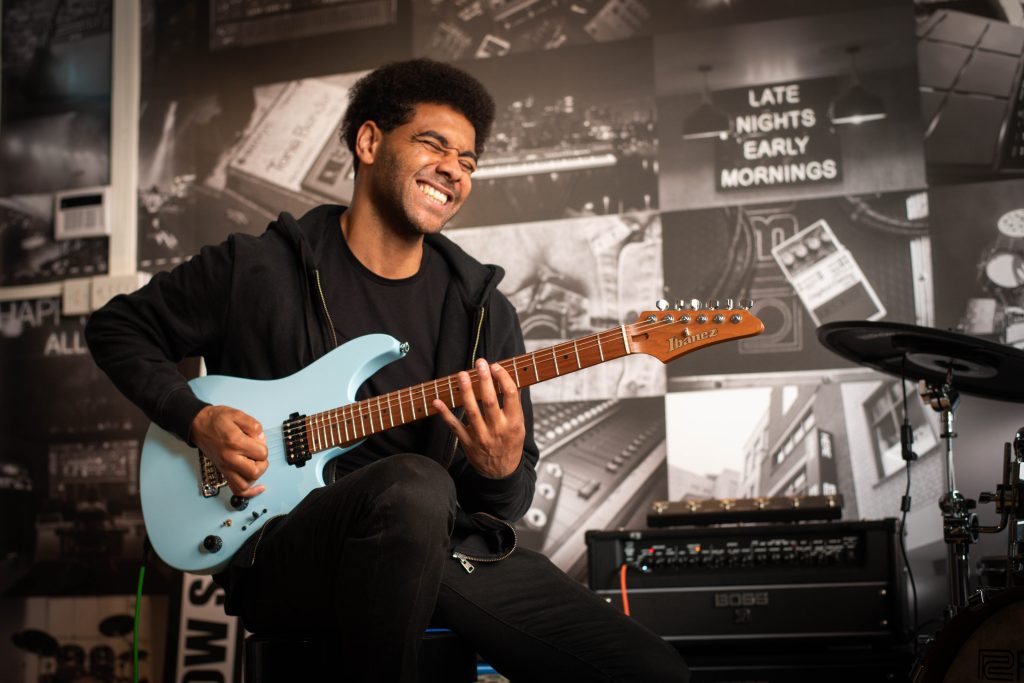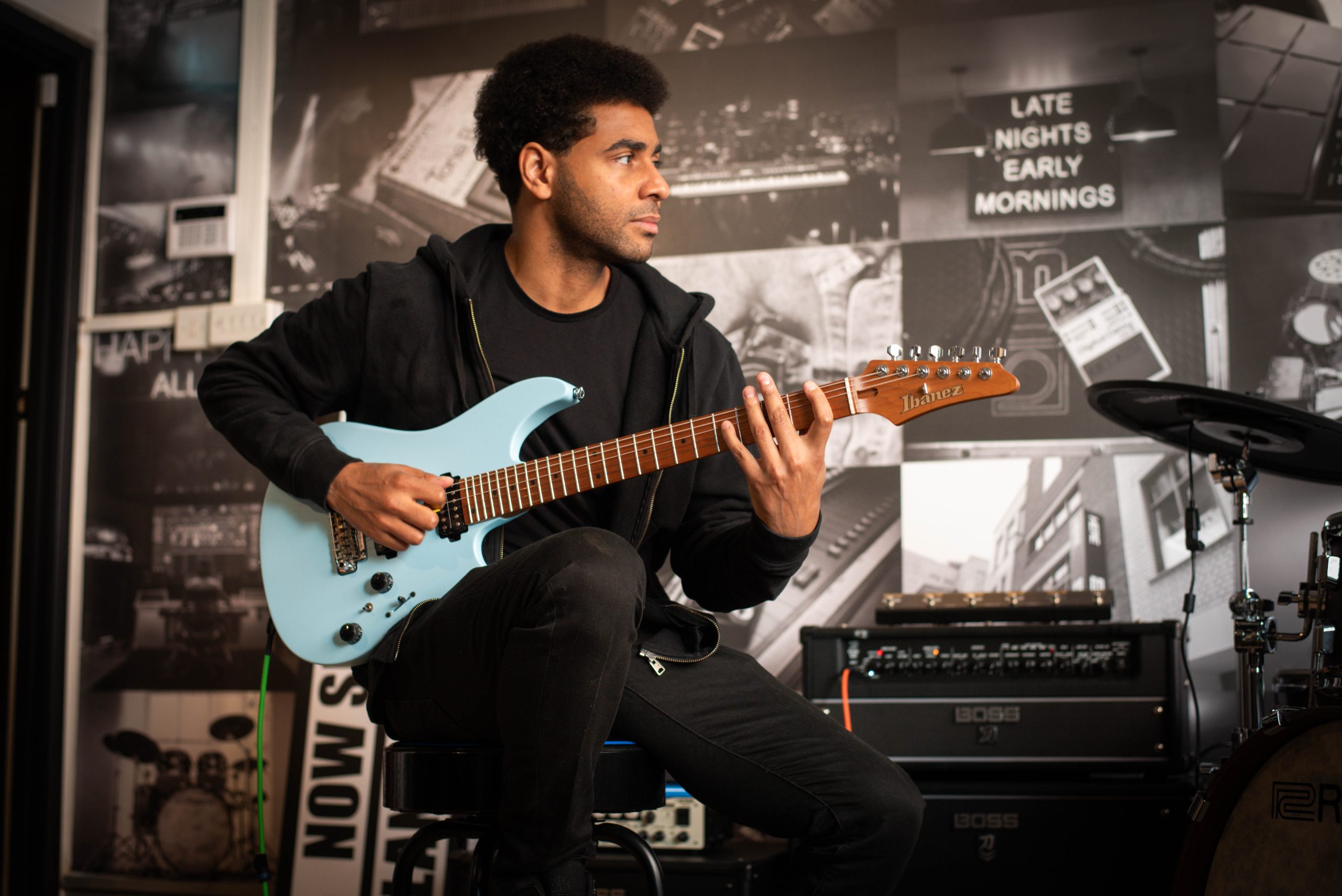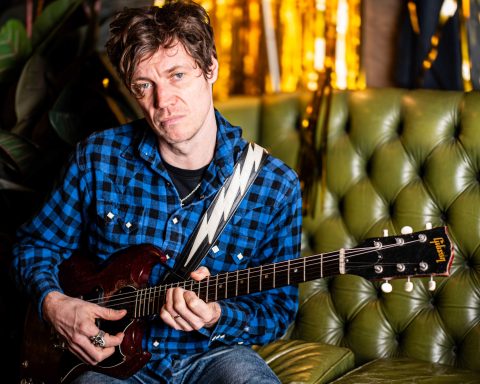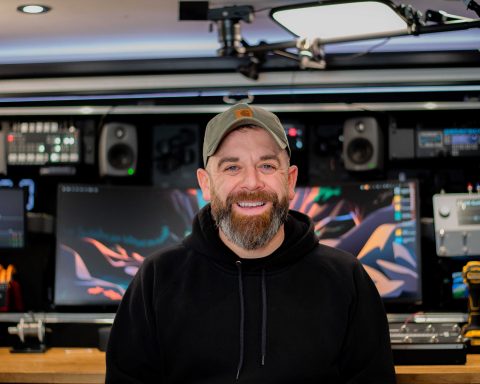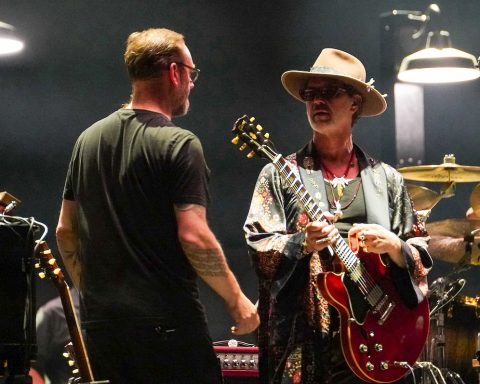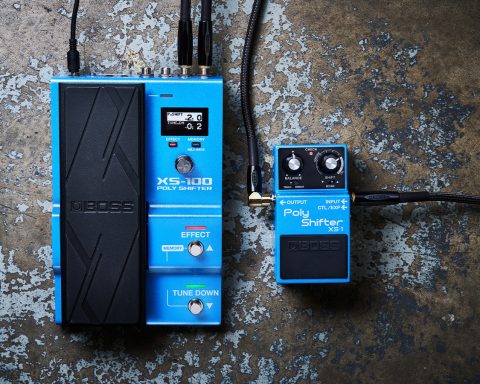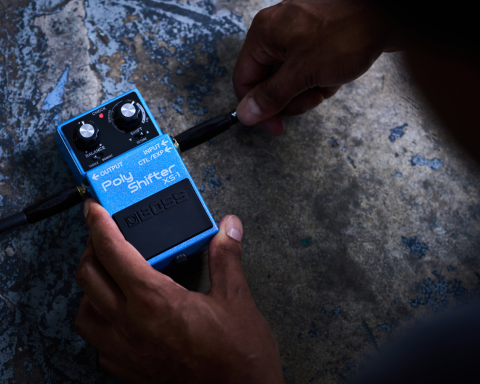Olly Steele is tougher on himself than anyone else. Despite turning heads with his fluid technique and percussive chops, the guitarist doesn’t take a compliment easily. It’s part of his dry charm. Since cutting his teeth over a decade with prog-metal powerhouse Monuments, Steele has been establishing himself as a solo act, honing a fresh sound while releasing EPs and educating aspiring six-stringers online. Fusing detailed rhythmic patterns with a near-algebraic grasp of time signatures, he is at the forefront of a post-djent guitar movement. Steele walks us through his guitar history, the power of the BOSS XS-100 Poly Shifter, and why he would describe his sound as “funky rock” to a granny.
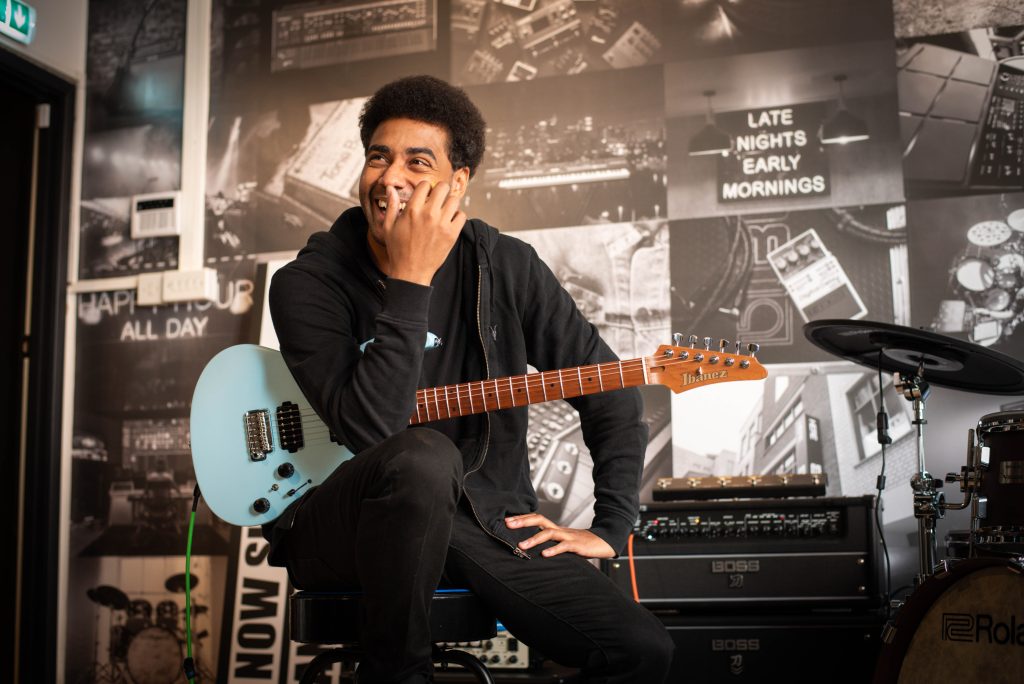
Random Axe Memories
What was your first musical memory?
I did like singing nursery rhymes, so something like that. I also took a lot of my dad’s CDs when I was a kid because he had Slipknot and Linkin Park, among the other stuff. It wasn’t even his main thing.
Who were your earliest guitar influences?
It would have been the boys from Killswitch Engage and the boys from Trivium—that kind of thing. The Roadrunner and Century Media metal bands that were around in the late 2000s, and in Kerrang!, Guitar World, Total Guitar, and Metal Hammer.
Did guitarists from the earlier era speak to you at all?
I found Andy Timmons really late, and I’m an idiot for that. Vai is so playful and a creative alien, always pushing it. Satch is like the melody, song master. Petrucci, I gravitated to more because he was the most aggressive and precise, and his band is progressive as well. There’s Yngwie, and obviously, Eddie.
Was there a point when your family saw you becoming—I hope you don’t mind me saying it—virtuosic?
I absolutely do mind you saying that. That’s crazy. I don’t think so. There may have been a moment where they realized that there was some obsession or dedication there. I think the turning point was when I said, “If you get me an eight-string guitar, I’ll go on tour with this band and do these dates.”
And they did get me the guitar, so I did go and do that tour, and that was a show of faith. A couple of years prior, they would have been like, “What are you talking about?”
"I think the turning point was when I said, 'If you get me an eight-string guitar, I'll go on tour with this band and do
these dates.'"
A Monumental Jump
What was your first serious band?
I was in a band called Cyclamen, a Japanese noise metal project with some post-rock elements. I went to college with their drummer, and he told me I should play with them because I wasn’t playing in a band after college.
Tell us how you joined Monuments.
With Monuments, it was weird because in their early days, they hadn’t posted pictures of themselves on MySpace. They were going for being a faceless project that just releases music. And I can’t remember how I came across their tune. I think it was on a mixtape from a label or something. I became obsessed with their music, but I wouldn’t know it if I bumped into one of them.
I think around that time the wires get a bit crossed, but I do remember strategically uploading a cover of Monument’s sister band, which is kind of a similar style. It was the same tuning, and I think that got me the tour. I bumped into Mike at a gig, and he had seen a YouTube video of me. That’s where things got rolling.
"It was just everything at once—crazy times. I was filling in for a tour with Tesseract, and then at the end, they decided I was in."
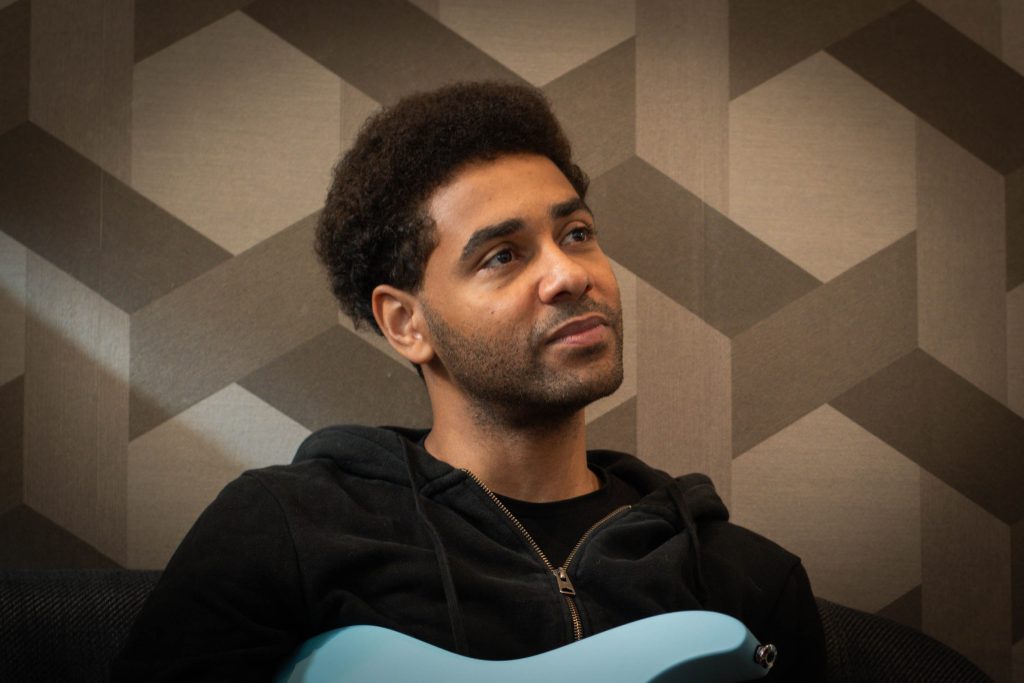
How did it feel coming into an established touring band?
It was just everything at once—crazy times. I was filling in for a tour with Tesseract, and then at the end, they decided I was in. I completely unprepared, way too young. I’d only played like a few gigs, maybe ten. Yeah, it was a lot.
I was very green when I joined, and they were extremely developed musicians. Both the drummer and the guitarist, specifically, developed a great sense of melody and rhythm with a lot of knowledge and amazing groove—crazy technical skill. I’d never seen anything like that.
When it was time to move on, what did it feel like transitioning into a solo career?
I was with Monuments officially for ten solid years. After ten years together, you are a family. We learned how to communicate more, did bigger things, and covered more ground musically. A lot of buses and time spent together. Highs and lows.
Lockdown put a lot of things into perspective, and the future of bands and music was completely suspect. You might have put out a wicked album, and now you can’t tour it. The timing felt perfect for me. I told the guys how I felt, and they understood, and we’re still friends. I speak to them all the time. My body and my brain just knew it was time to leave.
"Lockdown put a lot of things into perspective, and the future of bands and music was completely suspect."
Breaking Down a Sound
If somebody asked you to break down what you do to your granny who may not understand all the sub-genres, how would you describe it?
I’d call it “funky metal” or “funky rock.” If I have to condense it to its simplest form, probably that. It is progressive music, but I think when you say “prog” or “progressive,” that sends you down a different lane. So, if I’m literally talking to my granny, I’m gonna say funky rock, and I think she’d get it.
Let’s flip to the other side, and you’re talking to a major Kerrang! hound who knows every obscure band.
I hear a lot of jazz people say, “We’re not playing jazz—we’re just playing music.” I thought it sounded cool, but I didn’t get it. Now I’ve come to a point where I have experienced enough that I am just playing music. Sometimes it happens to be heavier, and sometimes it’s not.
The thing about the style I love is that you can put everything in it. So “funky rock” is how I would describe it to my granny, but that’s not the whole story at all. The whole story is too long.
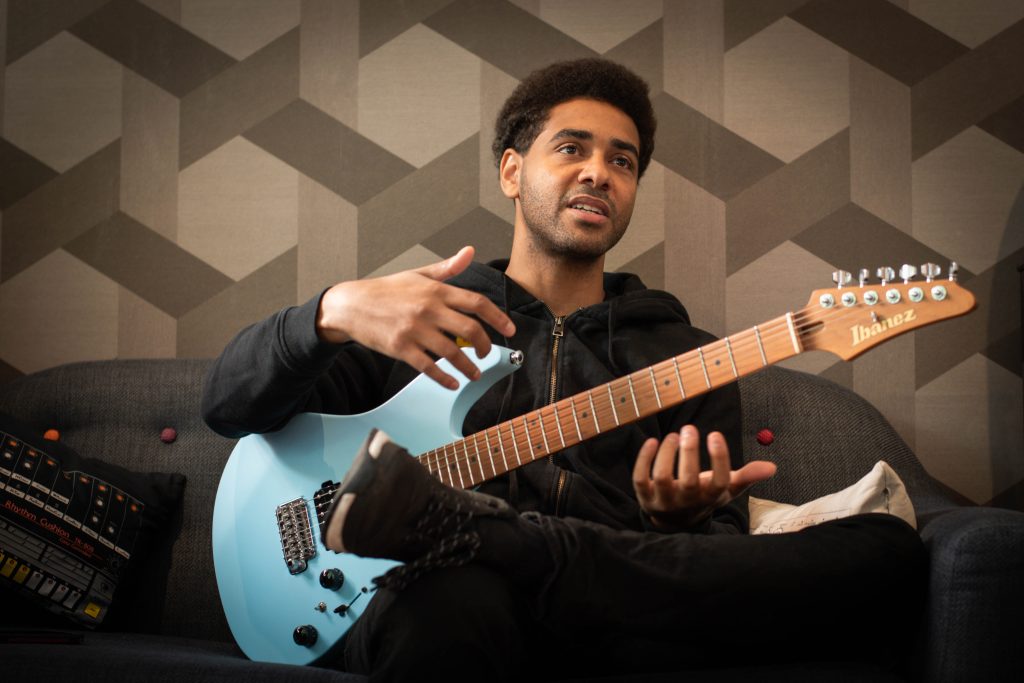

"'Funky rock' is how I would describe it to my granny, but that's not the whole story at all. The whole story is too long."
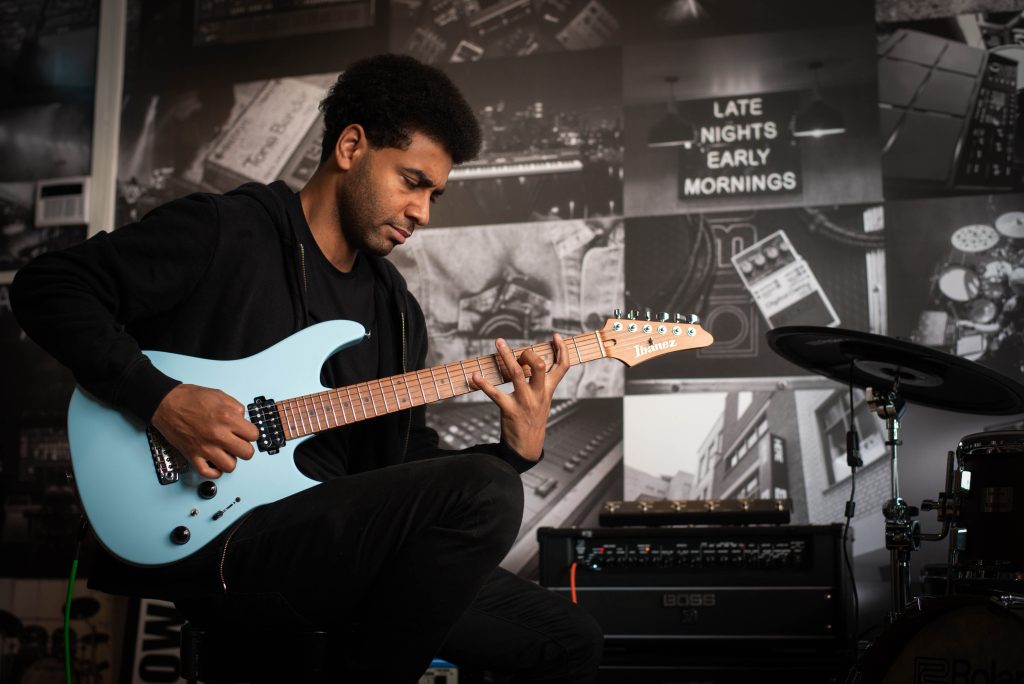
A Precision Craft
Your approach is incredibly syncopated and precise. Do you slow things down to get the details right or dive in at full speed?
I’ve definitely been guilty at times of writing stuff that I think is good enough for the demo. Then, when it comes to tracking day, I’m like, “This is a very tricky riff, Olly! Why didn’t you practice this?”
For the most part, you have to play things slowly and work them up. Unless you’re working with techniques you can use like a reflex. It’s however I can get there, so if that means working slowly, cool. Some things are already there because I’m naturally quick, but not naturally that accurate.
It sounds like you’re continually reaching outside your comfort zone to find the less comfortable licks.
I’m really glad you brought that up. If you’re not trying something new, then you’re not doing anything. And whether musicians are cognizant of that or not, it’s a thing. I really want to add a new element that’s quite significant each time. And that is hard because it gives you a small option of things that you can select from.
The way you combine lead and rhythm playing is seamless. Were there players that influenced you in that direction?
One example is a song called “Into the Wasteland” by God Forbid. There’s a break quite early in the song where the band stops and the guitar plays a little lick that becomes some chords. I remember where I was when I heard that, and it struck my soul. I felt shivers, and I was like, “That is so beautiful and so sick.”
"I remember where I was when I heard 'Into the Wasteland' by God Forbid, and it struck my soul. I felt shivers, and I was like, 'That is so beautiful and
so sick.'"
On the Pitch
Let’s talk about the BOSS XS-100. How did you explore it?
Initially, I was very excited because I wanted to mess with pitch stuff, which is extremely popular in heavier metalcore. It’s really part of the aggressive sound of heavy music. I saw how many different ways you can manipulate pitch with this thing.
When you got the XS-100 in hand, were you initially doing downtuned stuff?
Yeah, I started there; that’s the natural thing. I was messing around, playing an octave lower than I was in drop C. You’re able to change the pitch of a chord halfway through a chord, making the second half higher. You can descend, do backwards effects where they sound like dive bombs.
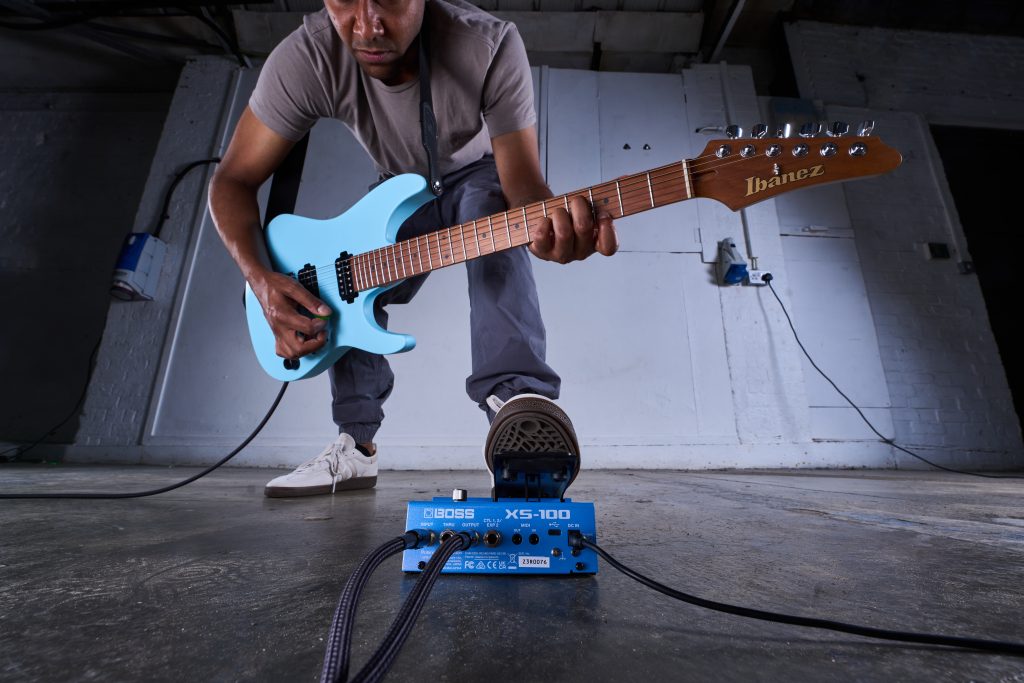
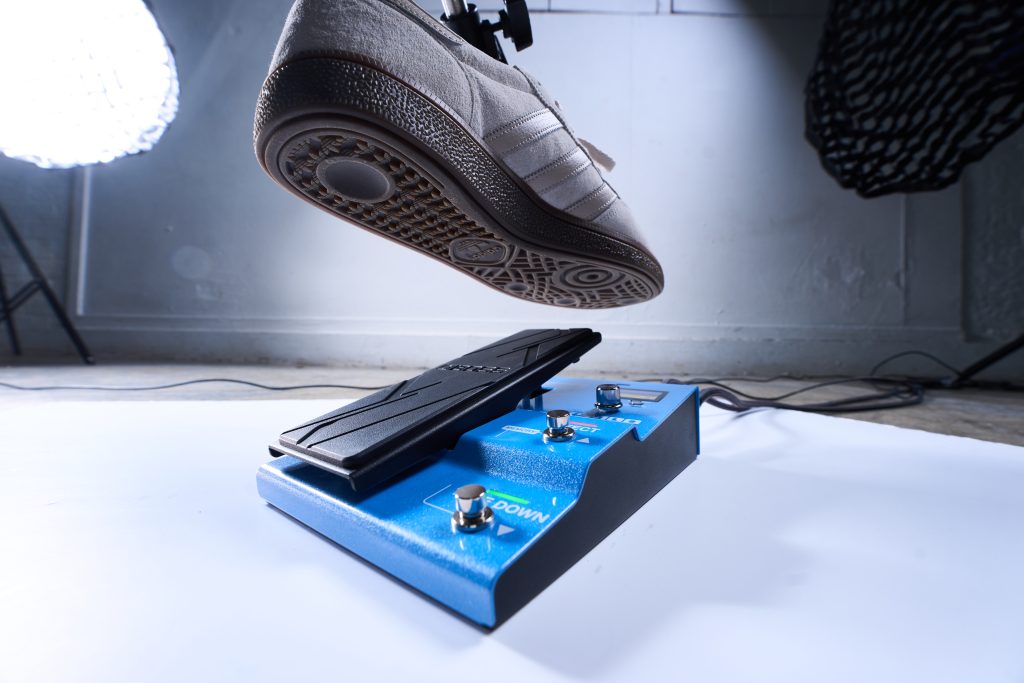
"You're able to change the pitch of a chord halfway through a chord, making the second half higher."
"The XS-100 is a player's toy. If you want to speak, to actually control and throw and feel the waves of the pitch as you move it, then you need this."
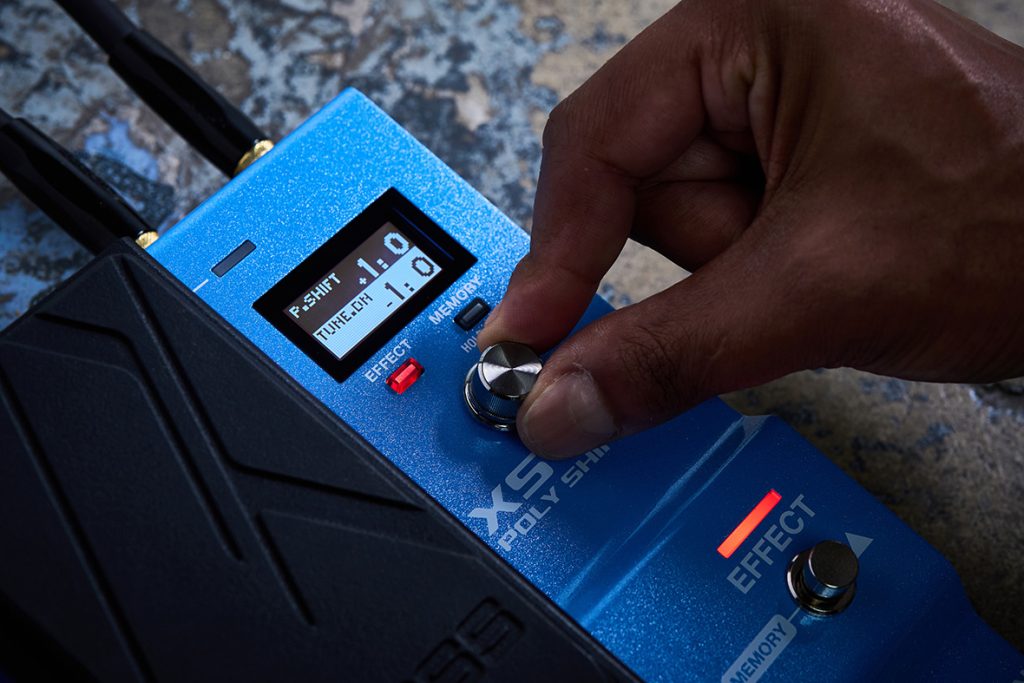

Did you discover any cool XS-100 tricks?
You can split the pitch. At one point, I’m tapping, and then I go up a fifth every time. That’s really cool. Also, using the through with the bass, you have the original signal, and then the higher signal is now a fifth, so that you get a bass power chord. That’s quite prominent in the video. That’s really cool. And then there’s the standard, where I’m playing a riff and it’s up an octave or two octaves.
The XS-100 is a player’s toy. If you want to speak, to actually control and throw and feel the waves of the pitch as you move it, then you need this.
Do you remember your first BOSS pedals?
The MT-2 Metal Zone had to be first. You take your little whatever pocket money you have, and then you look through the glass counter, and you’re like, whichever one sounds most distorted. There’s a lot of bang for your buck there. And the NS-2 Noise Suppressor is huge for me.
"You can descend, do backwards effects where they sound like dive bombs."
Sci-Fi Guitar Heroics
You collaborate with numerous artists, such as Connor Kaminsky and Adam Benjamin. How does that process work?
I have a room in my house where I can record audio; I wouldn’t call it a studio. Connor just asked me to do something, gave me a certain number of bars, and said, “Do whatever you want to do.” I went and recorded it and sent him the files. He mixed it all, re-amped me, and made it fit perfectly into his song.
Conor gets my style really well. He’s said nice things about my playing, and he’s way better than me, by the way. He’s a crazy guitar player.
With Adam, we did four songs. Two were written instrumentally beforehand. The second two, we were vibing, so I found some other bits and we finished them. It was quite free in that way.
"My guitar heroes are all the guys we talked about before who have crazy legacies and classic albums under
their belts."
Are you involved in the otherworldly sci-fi aesthetic on your release covers?
If it looks like a liquid sploosh thing, I would have art-directed it. But they’re all suggestions, and I’m like, “That’s cool, let’s iterate on that.” I do like that Star Wars thing, where it’s like high tech but they all look broken, you know?
Do you feel comfortable with the term guitar hero?
I’ve heard it, but to me, that’s ridiculous, because my guitar heroes are all the guys we talked about before who have crazy legacies and classic albums under their belts. I don’t even play gigs at the moment—I don’t have a band. I’m currently working on solo projects. That’s hypothetical. So, if I’m being completely objective, yes, it’s lovely to hear, and I’ll keep playing. But Zach Wylde is still out there.
